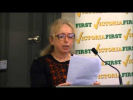
Why is Melbourne's population projected to skyrocket, all of a sudden? What is driving this? Why are people confused between refugees and economic immigration. Why can't we communicate and organise in order to bring the government into line? Why do our governments ignore the people?
"The talking stick, also called a speaker's staff is an instrument of aboriginal democracy used by many tribes. It may be passed around a group or used only by leaders as a symbol of their authority and right to speak in public. In a tribal council circle, a talking stick is passed around from member to member allowing only the person holding the stick to speak. This enables all those present at a council meeting to be heard, especially those who may be shy; consensus can force the stick to move along to assure that the "long winded" don't dominate the discussion; and the person holding the stick may allow others to interject. "[1] An open mike is the same kind of thing. This talk is about how elites have got control of the talking stick and how to get it back.
Speech for Must Melbourne keep growing? by Sheila Newman June 14, 2014
The question is does Melbourne have to keep growing? My response is that it is not a natural inbuilt requirement that populations constantly increase in size. Many developed and undeveloped countries and regions are not growing like Australia. Pacific islanders had stable populations for about 60,000 years. Although most industrialised countries ballooned with industrialization and access to cheap fossil fuel, many reset their population growth downwards after the game-changing 1973 oil shock. But countries that inherited the British land-tenure and political system – the United States, Australia, Canada – did not reset; they borrowed to continue population growth and expansion. Secondly, there is no economic imperative to keep population growing, as is being done, via high immigration. Plenty of countries survive well with small stable populations.
So why is Melbourne’s population projected to skyrocket? Unfortunately, the problem is that population increase is being engineered by sociological forces that are responding to focused benefits from the very things that cause suffering to the rest of us and damage the natural world. By this I mean that, via high immigration policies, powerful people in various business groups are successfully enacting pro-growth ideologies. All that the counter-growth movement is really asking is for the growth lobby to desist and allow our population to evolve naturally and democratically. We are not the population controllers; they are.
These pro-growth forces are highly organized, very determined, and very wealthy. They own and control most of the assets and resources, including the mass media and, arguably, large parts of Australia’s parliaments. The rest of us are relatively disorganised and poor because of this political system which concentrates land, resources and power in fewer and fewer hands.
Some traditional avenues of resistance exist, although all are compromised in this system. One new one is present – the Internet. The traditional options are:
- power in public institutions and utilities;
- power of employment connections;
- power of family communication;
- power of local government;
Power in public institutions and utilities: Historically, even though our system placed much power in private hands, in the 19th and 20th centuries we built up public institutions that safeguarded citizens’ rights to affordable water and food, electricity, housing, education, reliable employment, regulated banking. Most of these public institutions that protected our rights have since been privatised and taken beyond our influence.
Power of employment connections: Unions once brought together workers with common cause to preserve financial and other easily identifiable benefits, but the supportive industrial relations and law institutions have largely been dismantled and Australian workforces are now dispersed and temporary.
Power of family communication: One of the problems of population growth and infrastructure expansion is that it means that planners constantly insert new people and groups and buildings and roads and activities among us, interfering with established human networks. Family communication is also an uphill battle with TV, Facebook, school, commuting to work, and if you are one of many isolated Australians going from one rental to the next, couch surfing or sleeping rough. Ironically, wealthy families and clans that stick together, like the Dennis Family Corporation, the Murdochs, the Packers and the Winsors, rule the world. As more Australians become unemployed and cannot afford housing, the upside is that they will default back to family, clan and locality and communicate with neighbours on issues of mutual convenience and grow food and trade at the same level. Direct power at local level, accessed by well-networked families and clans together with neighbours is probably the most effective way to counteract the growth lobby on the ground and decisions by unrepresentative distant central governments. Women seem to lead most of the coordinated actions against overdevelopment and overpopulation in Melbourne, heading democratic planning groups, public land defence groups, ecological and wildlife protection groups, contributing to alternative media, attending parliament and organising demonstrations. They are our great strength. Their political engagement is under-reported in the mainstream media as you would expect.
Power of local government: Most people believe that immigration is entirely managed by the Federal Government, but it is at the level of local government that population control actually starts. Local Government traditionally controls building permits to control population numbers by limiting subdivisions and land clearing. This mechanism gave Australians direct control over the size of their communities. State governments in Australia have been removing this very important local government power over decades, with local government amalgamations, administrative control and laws reducing local power. Local power is the most direct and potentially useful form of democracy, more likely to unite people with a stake in the same bit of the real world.
State Government: In Australia the states have the power over land-use and water sources and the ability and responsibility to signal when infrastructure is close to capacity. They have largely taken over immigration policy decisions from the Federal government by calling themselves regions in need of migration and setting up websites and industries to market housing, business investment, and citizenship to prospective economic immigrants all over the world. All the states do this, but in Victoria the website is www.liveinvictoria.vic.gov.au . Obviously this website needs to come down.
The National Government makes decisions to support wars and sets policies for humanitarian and economic immigration. The public messaging system has erroneously convinced many people that most immigrants are ‘refugees’, using the issue as a wedge tactic to prevent people speaking out on numbers. At the same time, the media fails to critically examine the fact that many of our refugees and asylum seekers come from the places where we are engaged with NATO in what are arguably illegal resource wars. The Australian public is given no say in whether we support such wars.
The pro-growth forces control the mass media – that is, the public messaging system, which seems largely to control election choices and politicians’ policies. The effect is that, although the majority of Australians do not want population growth or its impacts, their opinion is not clearly reported and they are not aware of each other. Most of the Australian media and much overseas media are owned by Packer, Fairfax and particularly the Murdoch corporations which have vested interests in massive population growth, most obviously in their property dot coms (realestate.com.au and domain.com.au) , which sell Australian land and housing all over the world in a market that is enhanced by the promise of continuous population growth. CNN, the BBC, Al Jazeera, the ABC and SBS and generally all mainstream Anglophone press share biases and syndicate reports.
The Internet: So, how do we overcome a commercially compromised and unresponsive public messaging system that repetitively purveys this propaganda, making us believe it is both irresistible and true? By going around it and creating media that is far more relevant to most people, on the principle that real news is of real interest and that people, although schooled to passively absorb anointed opinion, if they wake up, don’t want to go to sleep again.
The traditional media relies a lot on distant authorities and events, which we cannot verify or affect. The alternative media can convey news from people on the ground, almost anywhere in the world.
The traditional media creates ‘stars’ and elevates as ‘authorities’ people who continually tell us that we must have growth. It is hard to get the attention of family, neighbours, colleagues and friends to our divergent point of view because they are conditioned to give more respect to mass media stars and opinions than to direct communication and experience.
The alternative media can identify our own real heroes and authorities – like the many women in Melbourne who head up groups to fight overpopulation and its impacts us. We can use the internet to do this, as many grass-roots organisations and BRICS countries now do.
The traditional media syndicates news and feature articles. We should do the same by republishing each other’s work on our various websites, by reciprocal interviewing and by inviting each other to speak at events, thus raising our mutual profiles and amplifying our impact collectively. Whilst it is often helpful to get a ‘mainstream’ celebrity to speak at an event, try to put some of your own on the stage as well, so that they will become known in their own right. Present them as ‘experts’. This is what the Property Council of Australia and APop do.
The Candobetter.net website, where I write and edit, promotes population activists and their activities where the mainstream press ignores them, preferring paid spokespeople from big business who tout growth. Our articles get thousands and tens of thousands of reads over time. One recent article got 12,000 reads in 3 weeks. We are actually a website for reform in democracy, environment, population, land use planning and energy policy.
Publishing on
Candobetter.net is a lot surer than writing letters to the Editor at the
Age, or the
Herald Sun, or the
Australian or the
Fin Review. Try it some time.
Publishing on Candobetter.net is a lot surer than writing letters to the Editor at the Age, or the Herald Sun, or the Australian or the Fin Review. Try it some time.
Ideally Candobetter.net would like to be one of the alternative sites that together will replace the mainstream media middleman with more direct and diverse analysis and reports from the field.
Direct and Reliable sources of information
Instead of just reacting to mainstream disinformation, population writers and activists can access direct sources of information. Hansard is a superb direct source of politics, laws and news providing great speeches, hilarious examples and insights into our parties and politicians. Scientific sources include the CSIRO Futures program which produced the Australian Resources Atlas project and the report, Future Dilemmas. The State of the Environment Report Australia 2011 is still a good guide, and is pessimistic about population impacts even though its population projections of 100,000 net migration vastly underestimate our current population trajectory. The State of the environment reports [for]Victoria are increasingly politicized, so that the conclusions of the 2010 one did not make sense in the light of its content. The most recent one, for 2014, lacks comparability with the 2010 one, which defeats an important objective of these reports. ABS projections are a very necessary source of important information and part of public education. They rely, however, on past trends and on getting good information. They do not or cannot predict or allow for changes of policy or influence of lobby groups, except in general terms of higher or lower projections. You Tube is another direct source of information, and of course there are independent blogs and videos all over the web. As well as this, instead of just hearing the NATO line, try getting the other side from RT (Russia Today) which has great interviews, documentaries, and news and war coverage. Some other well-known alternatives are Press TV, Global Research, Voltaire Net, PaulCraigRoberts.org, the
Land Destroyer Report and the Syrian Arab Newsagency (SANA). If you speak another language you can search foreign amazon sites for books with different perspectives then order them without the usual publisher restrictions via eBay.
Resource Depletion: Sustaining growth depends on fuel. For a while there it looked like people were beginning to wake up to the finitude of petroleum and the difficulty in replacing it, but recently there has been a desperate con-job called US shale oil independence. This petroleum energy renaissance can be shown to be a wild exaggeration and has been reported as such by Bloomberg in "Dream of US Oil independence slams against shale costs." http://www.bloomberg.com/news/2014-02-27/dream-of-u-s-oil-independence-slams-against-shale-costs.html, which costs shale oil production at $1.50 for every $1.00 produced.[2]
It is really important for activists to get their heads around this because, if people believe that – first gas, now coal seam gas and shale oil – will keep business as usual, they will not resist unsustainable population growth as hard as they must.
NOTES
[1] http://en.wikipedia.org/wiki/Talking_stick
[2] "Just a few of the roadblocks: Independent producers will spend $1.50 drilling this year for every dollar they get back." And, "Shale output drops faster than production from conventional methods. It will take 2,500 new wells a year just to sustain output of 1 million barrels a day in North Dakota's Bakken shale, according to the Paris-based International Energy Agency. Iraq could do the same with 60." http://www.bloomberg.com/news/2014-02-27/dream-of-u-s-oil-independence-slams-against-shale-costs.html.
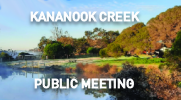 6.30pm Feb 6, 2025, at Seaford Community Centre: Talbot Hall or (depending on the weather) in the shade on the lawn between the Hall and the Creek. Public meeting to discuss the future of Kananook Creek Corridor planning. Please join us in attending to show your support for the Kananook Creek Association (KCA). FCC has dissolved the Kananook Creek Governance Group without consultation.
6.30pm Feb 6, 2025, at Seaford Community Centre: Talbot Hall or (depending on the weather) in the shade on the lawn between the Hall and the Creek. Public meeting to discuss the future of Kananook Creek Corridor planning. Please join us in attending to show your support for the Kananook Creek Association (KCA). FCC has dissolved the Kananook Creek Governance Group without consultation.
 Yesterday, on 8 December 2023, Miko Peled, spoke at a public meeting about Israel's murderous war against Gaza, which commenced over two months ago on 7 October and the broader context of the history of the Palestine/Israel conflict going back more than 75 years. Much of what he said from his own personal experience. The meeting was held in the public library of Bethlehem in the US state of New York.
Yesterday, on 8 December 2023, Miko Peled, spoke at a public meeting about Israel's murderous war against Gaza, which commenced over two months ago on 7 October and the broader context of the history of the Palestine/Israel conflict going back more than 75 years. Much of what he said from his own personal experience. The meeting was held in the public library of Bethlehem in the US state of New York. Our webinars are a great place to learn about animal rights issues and the campaigns that are working to create a kinder world. You will also discover ways you can get involved, and connect with like-minded people. See below to know some of the people who will be presenting there.
Our webinars are a great place to learn about animal rights issues and the campaigns that are working to create a kinder world. You will also discover ways you can get involved, and connect with like-minded people. See below to know some of the people who will be presenting there. SUNDAY, 19th March, 5pm, Marrickville Town Hall, Marrickville Rd, Marrickville,NSW. You can join the meeting virtually livestream via the Marrickville Peace Group Facebook. Speakers: Bob Carr, David Shoebridge, Alison Broinowski, Lawrence Wilkerson. IPAN supports this event.
SUNDAY, 19th March, 5pm, Marrickville Town Hall, Marrickville Rd, Marrickville,NSW. You can join the meeting virtually livestream via the Marrickville Peace Group Facebook. Speakers: Bob Carr, David Shoebridge, Alison Broinowski, Lawrence Wilkerson. IPAN supports this event.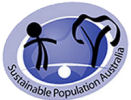
 This seminar will be at the Sustainable Population Australia (Victorian and Tasmanian branch) Annual General Meeting, Saturday September 29th 2018 at 2.30 pm, in the Hawthorn Library meeting rooms 3-4, 584 Glenferrie Rd, Hawthorn VIC 3122. Followed by afternoon tea.
This seminar will be at the Sustainable Population Australia (Victorian and Tasmanian branch) Annual General Meeting, Saturday September 29th 2018 at 2.30 pm, in the Hawthorn Library meeting rooms 3-4, 584 Glenferrie Rd, Hawthorn VIC 3122. Followed by afternoon tea. 
 Rally at 1.30pm. This Saturday 24 September 2016, Martin Place (Railway Station outside MLC Centre), Sydney City.
Rally at 1.30pm. This Saturday 24 September 2016, Martin Place (Railway Station outside MLC Centre), Sydney City. 7 pm, Longbeach Place, 15 Chelsea Road, Chelsea. Monday, 19th October 2015. Recent research has found that vegetated coastal habitats –seagrasses, salt marshes and mangroves are amongst the most effective carbon sinks on the planet – up to 40 times terrestrial habitats.
7 pm, Longbeach Place, 15 Chelsea Road, Chelsea. Monday, 19th October 2015. Recent research has found that vegetated coastal habitats –seagrasses, salt marshes and mangroves are amongst the most effective carbon sinks on the planet – up to 40 times terrestrial habitats. Why is Melbourne's population projected to skyrocket, all of a sudden? What is driving this? Why are people confused between refugees and economic immigration. Why can't we communicate and organise in order to bring the government into line? Why do our governments ignore the people?
Why is Melbourne's population projected to skyrocket, all of a sudden? What is driving this? Why are people confused between refugees and economic immigration. Why can't we communicate and organise in order to bring the government into line? Why do our governments ignore the people? Videos of KELVIN THOMSON and all panel speakers have been added to this article. Open mic part now published here too. Today, June 14, 2014, a packed hall with people standing at the back in the Hawthorn Arts Centre voted for a national plebiscite to ask the people what size population they wanted. The forum interacted with a panel of four speakers: Kelvin Thomson, MP for Wills; Sheila Newman, Evolutionary Sociologist and Candobetter.net editor and writer; Clifford Hayes, former Bayside Council Mayor and planning activist; and William Bourke, Leader of the Sustainable Population Party. There was a queue for the open microphone and the meeting closed later than expected. All motions passed with an overwhelming show of hands.
Videos of KELVIN THOMSON and all panel speakers have been added to this article. Open mic part now published here too. Today, June 14, 2014, a packed hall with people standing at the back in the Hawthorn Arts Centre voted for a national plebiscite to ask the people what size population they wanted. The forum interacted with a panel of four speakers: Kelvin Thomson, MP for Wills; Sheila Newman, Evolutionary Sociologist and Candobetter.net editor and writer; Clifford Hayes, former Bayside Council Mayor and planning activist; and William Bourke, Leader of the Sustainable Population Party. There was a queue for the open microphone and the meeting closed later than expected. All motions passed with an overwhelming show of hands.
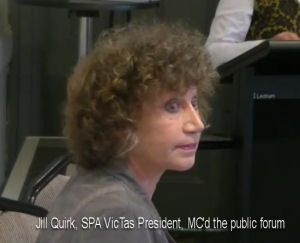

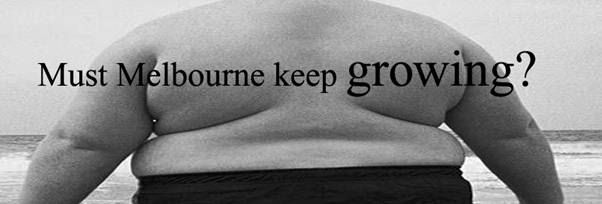
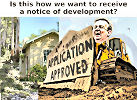 There will be a public forum a Kuringai Town Hall to discuss the problem of overdevelopment, overpopulation, and the crushing of democracy in its wake TODAY. Sunday 7 April 3:00 pm to 5:30 Where: ku-ring-Gai Town Hall, 1186 Pacific Hwy, Pymble.
There will be a public forum a Kuringai Town Hall to discuss the problem of overdevelopment, overpopulation, and the crushing of democracy in its wake TODAY. Sunday 7 April 3:00 pm to 5:30 Where: ku-ring-Gai Town Hall, 1186 Pacific Hwy, Pymble.
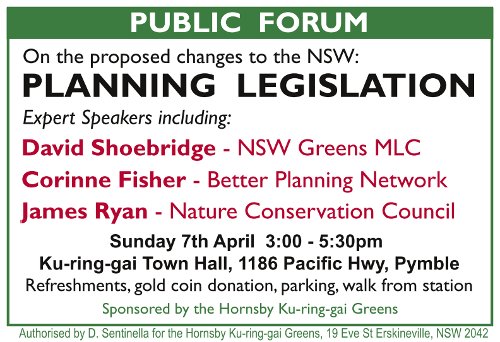


Recent comments